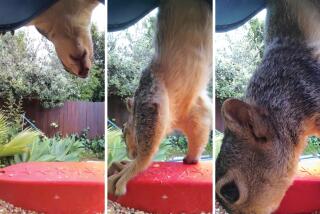Accidental Pet Poisonings
- Share via
On March 13, The Times carried a piece by Martha L. Willman bemoaning the fact that she had accidentally caused the terrible suffering of her beloved Labrador while she had only meant to poison the squirrels and other wildlife that were annoying her (“The Drive to Save a Fading Friend”). Some time ago, Sandy Banks had a similar column wailing about the very same thing. She meant only to kill the mice in her yard, not her children’s pet dog (“Hard to Say Goodbye to This Friend of the Family,” Jan. 26, 1998).
Both writers describe in detail the awful effects of the poisons they used, but neither expressed any remorse for the obviously dreadful pain they caused the wild animals that had inconvenienced them while simply trying to survive. It is incomprehensible that anyone who loves dogs and horses could do this to any animal.
Willman enumerates the dangers to pets and wildlife of the substances we use with no intention to kill or harm any creature. This should certainly give us good reason to eliminate the poisons we knowingly use to kill. Neither Banks nor Willman mentions that these “pest” poisons can easily be consumed by children. Also, what if a squirrel drops a pellet in your horse’s hay, or on a nibble of grass in your corral? That would be unfortunate indeed.
While Willman was watching her dog suffer and another dog die, did she think about the squirrel, with no one to help? Apparently pain is only felt by us and ours. It is good perhaps that Willman had this terrible experience to see that poisons are meant to kill and in a very cruel way. The creatures she eliminated for her convenience must have suffered terribly too. That was not mentioned. The recounting in this column of two decades of poison control “without incident” is a case in point. There must have been a great many “incidents” in the wildlife population in that 20 years. How can anyone watch a dog die from a poison meant for squirrels and not wonder how the squirrels feel?
My suggestion to Willman and Banks is to read Albert Schweitzer, whose belief in the reverence for life might be food for thought. This famed doctor, philosopher, musician and humanitarian must be spinning in his grave.
VIRGINIA McCAULEY, Studio City
More to Read
Sign up for The Wild
We’ll help you find the best places to hike, bike and run, as well as the perfect silent spots for meditation and yoga.
You may occasionally receive promotional content from the Los Angeles Times.






